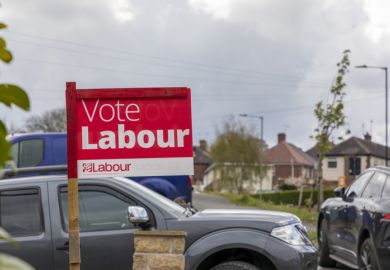Further tuition fee rises in England would be “politically difficult” and impact on widening participation, according to a former universities minister who suggested that removing loans from students from wealthier families may be a “fairer” option.
Dame Margaret Hodge, an architect of the last Labour government’s top-up fees while serving as minister of state for universities between 2001 and 2003, said a “really radical” option for a future government would be to look again at who is eligible for a taxpayer-backed loan, in light of the constraints on funding the sector is experiencing.
“I am not sure why the state is providing financial support, even in the terms of loans, to students from higher income backgrounds and whether that is really, when you are talking about priorities, where we should be putting our money,” Dame Margaret told a webinar on the future of universities hosted by The Policy Institute at King’s College London.
She said that the “debt burden” was increasingly deterring people from going to university and cautioned against the “assumption” that fees can go up without consequences.
“I think that [raising fees] is politically difficult, it will impact on widening participation when we still have students from the higher socioeconomic groups being twice as likely to go to university than those from the lower socioeconomic groups.
“It holds us in a bind when I think we should be thinking about how we can help poorer students to actually access university more fairly” said Dame Margaret, who has just stepped down as an MP after 30 years in Parliament.
She questioned “why are we supporting, through the loan system, better-off students to live away from home whereas poor students are put off by the debt and never have that option to live away from home.
“If we could ask those sorts of questions from a student perspective, we may come up with a different answer within what will always be constrained resources.”
But Sir Chris Husbands, the former vice-chancellor of Sheffield Hallam University, whose paper on four possible futures for the sector was the topic of the event, cautioned against such a move.
“We’ve got to be really careful not to over-infantilise adults and not continue to hold young people to account on the basis of their parents’ income,” he said.
Dame Margaret, who said she was not privy to the discussions of the shadow cabinet, also offered some clues into Labour thinking ahead of the election.
She said the party was always more likely to put money into the early years and further education, although there may be opportunities for universities to access this by working more closely with the latter sector.
On the question of how the party may prevent university closures, Dame Margaret said: “I don’t think a Labour government would allow an institution to die.
“They may encourage a merger, or they may bring in somebody from outside; a commissioner of some sort to try to sort out the finances, which will entail cuts.”
Sir Chris said that any intervention would likely come before an institution got as far as bankruptcy and, although the appointment of a commissioner would present “legal challenges” given the independence of the sector, he agreed “there is going to need to be a transformatory regime”.
Register to continue
Why register?
- Registration is free and only takes a moment
- Once registered, you can read 3 articles a month
- Sign up for our newsletter
Subscribe
Or subscribe for unlimited access to:
- Unlimited access to news, views, insights & reviews
- Digital editions
- Digital access to THE’s university and college rankings analysis
Already registered or a current subscriber? Login








